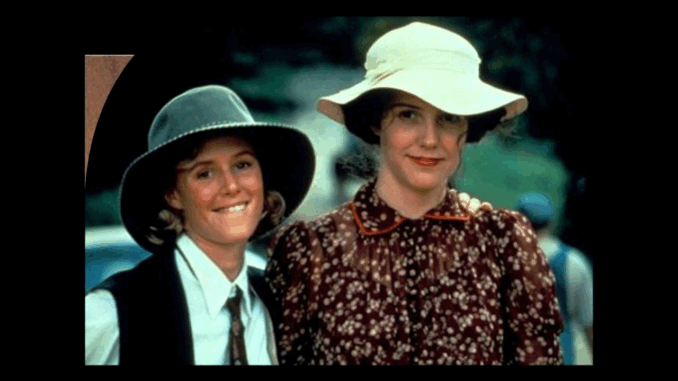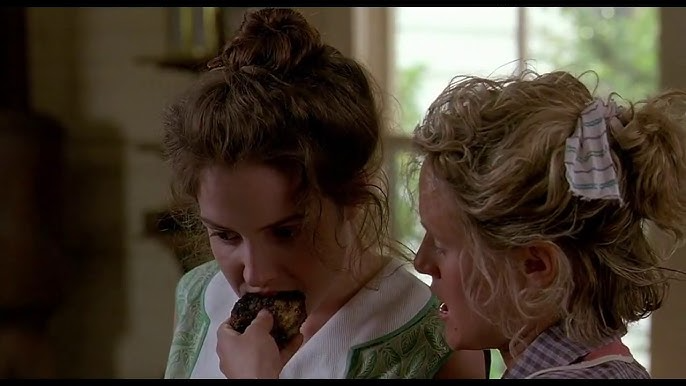
In the hush of an early Southern morning, when the mist still clings to the trees and the world feels half-asleep, Idgie Threadgoode sits at a worn wooden table with a blank piece of paper before her.
The coffee in her mug has gone cold.
Her hands — the same hands that once caught fireflies for Ruth, that once fought off anyone who dared to hurt her — now tremble slightly over the paper.
Idgie, the Bee Charmer, the Wild Thing, the Fearless, is about to do the one thing she never thought she would:
Let Ruth go.
Inside Idgie’s Mind: A War Between Heart and Pride
Writing the letter is an act of violence — but against herself.
Idgie isn’t the type to explain herself. She’s always chosen action over words. But now, words are all she has left. No grand gesture, no dramatic rescue. Only the brutal finality of ink on paper.
As she stares at the blank page, her thoughts race:
-
If I stay, I’ll make her life harder.
-
If I keep fighting, she’ll be hurt even more.
-
If I love her at all — I have to walk away.
But even knowing all that, it feels like sawing off her own arm.
There’s a fierce, stubborn voice inside her screaming, “Don’t you dare give up on her!”
And another, quieter voice — the voice that sounds like her mother’s, or maybe Buddy’s — whispering, “Sometimes love means stepping back.”

The Words She Chooses (and Those She Can’t Bear to Write)
Idgie grips the pen tightly, almost as if daring herself to finish.
She starts simple:
Dear Ruth,
But everything after that feels impossible. How do you say goodbye to the only person who ever looked at you like you were enough?
She wants to write:
-
“I love you more than life itself.”
-
“I can’t breathe knowing you’re stuck there.”
-
“If you call my name, I’ll burn the whole damn world down to get you.”
But she doesn’t.
Because Ruth is a married woman.
Because the world they live in would crush them both.
Because Ruth needs a chance to choose — freely, without pressure.
So instead, she writes:
I understand. I won’t bother you again.
And tucks all the unsaid things into the spaces between the words.
If you ever need me, you know where to find me.
No I love you.
No I’m lost without you.
Just a quiet promise, hidden like a secret between the lines.
The Silent Sacrifice
When she finishes, Idgie folds the letter with hands that no longer shake. There’s a strange calmness in her now — the kind that comes after you’ve been gutted and know you’ll never quite heal the same way.
She doesn’t seal the envelope right away.
She holds it, presses it to her chest, and lets herself feel everything:
-
Anger at the world that made their love impossible.
-
Grief at losing the only softness she ever allowed herself.
-
Pride because, even now, she won’t be the reason Ruth suffers more.
When she finally slips the letter into the mail, it’s like burying something sacred.
Idgie Threadgoode walks away from the post office that day not feeling brave, not feeling wild — but hollowed out.
What the Letter Truly Means to Idgie
It’s not just a goodbye.
It’s an act of devotion.
By walking away, Idgie shows a love that isn’t selfish, isn’t possessive. She gives Ruth what she believes she needs most:
Freedom — even if that means freedom from her.
If This Were a Scene We Could See
If the film had shown Idgie writing the letter, I imagine:
-
No music, just the creak of a chair, the scratching of pen on paper.
-
Idgie blinking hard, willing the tears not to fall.
-
A final long stare at the letter before she folds it, her shoulders sagging under invisible weight.
-
Her boots kicking dust as she walks away from the mailbox, leaving behind the one thing that tethered her heart.
Idgie’s Greatest Act of Love
For someone like Idgie, who lives by instinct and defiance, walking away is the ultimate rebellion — against her own heart.
The letter is proof:
Sometimes the most fearless thing you can do for someone you love… is let them go free.
